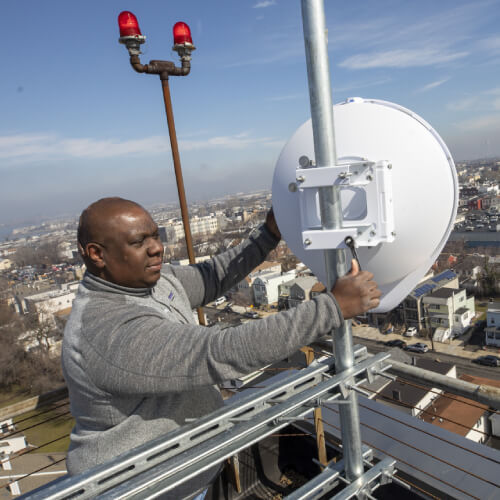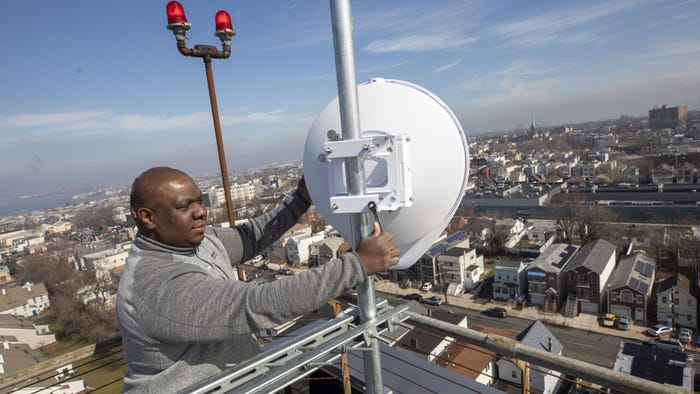Equipped with $15M, Andrena aims to scale its wireless model
Andrena is working to bring affordable wireless broadband to buildings through a revenue-share model with property owners.

A new wireless broadband company is emerging in the Northeast. And with $15 million from Dragonfly Capital, it hopes to take its end-to-end connectivity model nationwide.
Andrena, which got its start in 2017, is working to deliver affordable broadband to buildings by partnering with real estate owners and property managers through a revenue-share arrangement. The company currently provides service in "a bunch of different pockets" in Pennsylvania, New Jersey and New York, with a couple of deployments in Florida as well, said co-founder and CEO Neil Chatterjee in a conversation with Light Reading.
Rather than a fixed-wireless access (FWA) provider, Andrena is more of a fixed-wireless transport provider, said Chatterjee. The company incorporates decentralized wireless elements into its network and is one of the "largest deployers" of Helium 5G, which offers cryptocurrency for hosting its hotspots.
According to Chatterjee, elements like Helium are core to Andrena's overall vision.
"If you look at existing networks that are out there, they're very centralized and very passive. One of the things that we just built as a function of using wireless technology is a very active system. So every single node in our network is capable of being a much larger contributor in the overall Internet and cloud infrastructure," said Chatterjee.
"And one of the things that we're seeing as a big way in which that technology can be distributed, is through underlying crypto stuff – through what typically people call the DePIN, decentralized physical infrastructure networks," he said.
Figure 1:  An Andrena installation in progress.
An Andrena installation in progress.
(Source: Jennifer Brown Photography. Used with permission.)
To be sure, both cryptocurrency and decentralized wireless have their skeptics. But the crypto element is what drew in Dragonfly Capital, which raised $15 million in Series A funding in February from investors including Afore Capital, Castle Island Ventures, Chaos Ventures, FJ Labs, KohFounders, J Ventures and others.
"I think what people misunderstand about the crypto story is that, in order for us to hit true scale, which is a billion people using crypto, it has to be the connective tissue that is rewiring the world," said Anirudh Pai, partner at Dragonfly Capital. "The main problem with crypto is that ... it's not underpinned by any real value. I think Andrena flips that on its head. And now it's just a question of how far we can take this thing."
Revenue share with real estate
While Andrena delivers service to single family homes as well as multi-dwelling units (MDUs), the latter are its bread and butter.
"We find that MDUs are the best way to really go and capture a lot of good surface area, and they tend to be in dense [environments] and have a bunch of single family homes or mid-rises, low-rises surrounding them," said Chatterjee.
The company also describes its offering as a benefit to property managers in that Andrena covers the installation costs, offers service in common areas and creates a new funding stream for the building through a revenue-share arrangement.
It's affordable for residents as well, with prices starting at $25 per month and going up to $40. Speeds range from 100-500 Mbit/s, and can go up to 10 Gbit/s for deployments in new construction, said Chatterjee.
With those prices, and its participation in the Affordable Connectivity Program (ACP), Andrena is looking to partner with public housing authorities to deliver affordable or free broadband to low-income residents. The company landed one such contract last year with the Jersey City Housing Authority (JCHA) to deliver service to its 1,200 households, with prices starting at $20/month.
Similarities with Starry
Andrena both compares itself to and sets itself apart from another fixed wireless upstart, Starry, which entered the field with massive goals only to file for bankruptcy and significantly scale back its deployment and service plans. Starry also established partnerships with public housing developments, including Columbus, Ohio, a market it's exiting this year.
"They really built and set the standard ... they showed that hey, these point-to-multipoint networks in urban environments are really the way to go if you're gonna build out wireless there," Chatterjee said about Starry.
But one way the companies differ is in their service delivery, with Andrena running primarily on software and enabling residents to connect without in-home hardware once buildings are wired for the service.
"Because we are building this full-property wireless system, we don't have to roll technicians to install people," Chatterjee said. "We don't have to have a truck roll or anything like that. 99-plus percent of all our issues can be solved remotely with software. And I think when you approach your network that way, you have incredible unit economics that allow you to scale quite quickly."
Andrena aims to use its Series A funding to expand in states including California, Georgia, Ohio, Tennessee, Texas and Wisconsin. The company also recently grew to 30 employees, doubling in size, and is working to hire locally for its network construction.
Related posts:
— Nicole Ferraro, editor, Light Reading, and host of "The Divide" on the Light Reading Podcast.
About the Author(s)
You May Also Like




.jpg?width=300&auto=webp&quality=80&disable=upscale)







